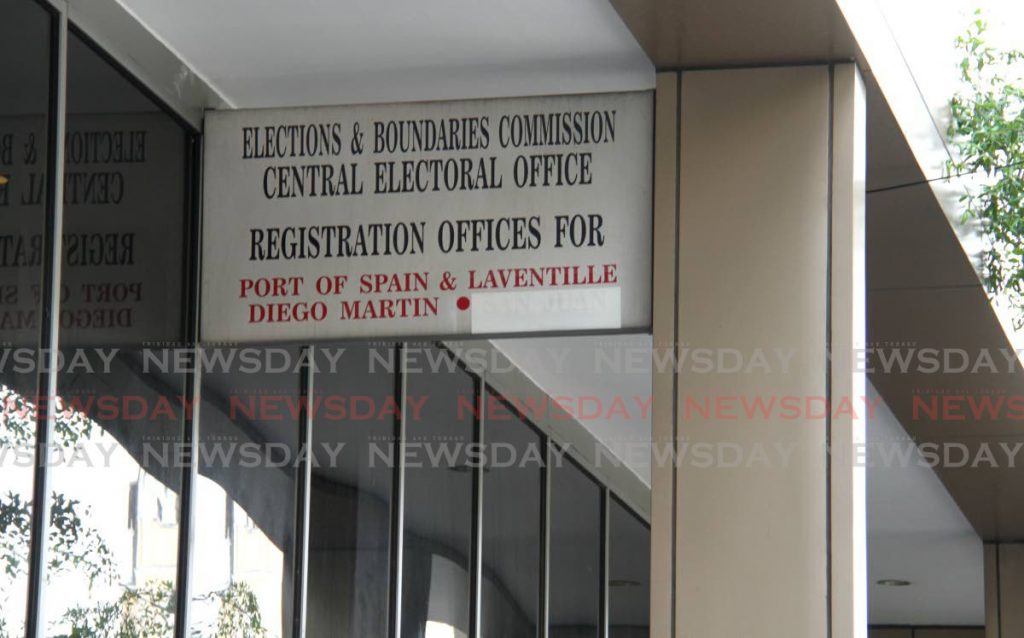EBC clarifies reports on querying election officials' politics

THE Elections and Boundaries Commission (EBC) has rejected reports alleging that it is asking its returning officers to declare their political allegiance.
The EBC made this comment in a statement on August 7, hours after the Prime Minister raised questions about this matter.
The commission said its chairman, Mark Ramkerrysingh, addressed a question about the potential political affiliations of returning officers at a journalism workshop, Enhancing Ethical and Effective Coverage, in Westmoorings on August 6.
The three-day workshop was organised by the Trinidad and Tobago Publishers and Broadcasters Association (TTPBA) and the Media Institute of the Caribbean (MIC), with support from the UK High Commission.
The statement said the EBC had received allegations from various political parties about returning officers being members of political parties.
"To address these concerns and safeguard the integrity of the electoral process, the commission sought legal advice on requiring applicants for the position of returning officer to declare whether they are a member of a political party," the EBC said.
The commission continued that the legal opinion "confirmed that such an inquiry is both advisable and lawful."
The EBC said: "It distinguishes between declaring whether one is a member of a political party and disclosing voting preferences, which is protected by the principle of secret ballot.
"Membership in a political party implies a level of allegiance or affiliation that could potentially create the perception of bias or apparent bias."
The EBC expressed its commitment to impartiality and transparency in the electoral process.
"Requiring applicants to declare their membership is a proactive step to mitigate potential conflicts of interest and maintain public confidence in the electoral system."
The EBC said recent media reports (not Newsday) suggested the EBC was asking returning officers to declare their political allegiance. It labelled such reports misleading and inaccurate.
It added, "The focus remains on ensuring that the electoral process is free, fair, and credible."
In a Facebook post on August 7, Dr Keith Rowley said the EBC's position on questioning its staff about their vote was absolutely unacceptable.
"The vote in this country is secret and no person in public employment must be forced to reveal how he or she voted or intend to vote. Returning officers are not to comply with this strange and disturbing development at the EBC."
Rowley, who is also the PNM's political leader, said: "The PNM, which has not been consulted on this matter, is resolutely opposed to this unnecessary and possibly illegal action. Where did this come from?"
On August 6, Opposition Leader Kamla Persad-Bissessar expressed concern about Ramkerrysingh's statement. Persad-Bissessar wanted details on the legal advice the EBC sought.
National Transformation Alliance (NTA) leader Gary Griffith, in a media statement on August 7, said he was deeply concerned about the EBC requiring all 41 returning officers to declare their political affiliations ahead of the next general election.
Griffith said: "While the EBC claims this move is within its legal rights, we firmly believe that it poses significant risks to people's constitutional rights and does not effectively address the core issues of electoral integrity and impartiality."
Griffith added that the right to political affiliation and the ability to vote for one's chosen party are fundamental, confidential and democratic freedoms guaranteed by the Constitution.
People disclosing their political allegiances infringed on these rights and set a dangerous precedent that could discourage qualified people from participating in the management and supervision of the electoral process, he argued.
"It is crucial to remember that holding a political belief does not inherently lead to bias or misconduct in fulfilling one's duties," Griffith said. "Asking returning officers to declare their political allegiances is unlikely to solve concerns about impartiality in the electoral process. There is a real risk that individuals could provide false information, thus nullifying the intended purpose of such a measure."
Logically, asking returning officers about their political affiliation questions suggested other public servants in and out of the EBC, as well as senior police officers, should be asked about their political beliefs, he argued.
The NTA urged the EBC and the Government to reconsider what it called an "ill-advised approach."
Griffith added,"Our democratic processes should be protected and enhanced, not weakened by measures that infringe on individual rights and fail to address the underlying challenges."
Griffith, a former police commissioner, suggested instead of focusing on political declarations, the Government should address the systemic issues affecting electoral integrity, saying the "outdated" manual voting system was "a significant factor in potential fraud and errors" and suggesting a move to to electronic voting.
He referred to the recent controversial election in Venezuela, saying that is why the opposition is so confident of victory – it claims to have the electronic data.
He added that sufficient international observers should be present at all polling stations to ensure transparency and credibility.

Comments
"EBC clarifies reports on querying election officials’ politics"